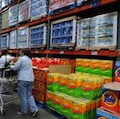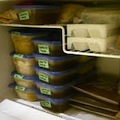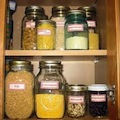Last week I had to throw away pears that went bad and it made me realize how rare it is that we need to throw away food in our house. In fact I think that we’re pretty good when it comes to managing what’s in the fridge and making sure that we don’t have to waste food.
Because some of my friends told me how they were having a hard time following the same non-wastefulness, I realized that it could be an interesting article idea to share some of my tips which I’ve been picking up over the years in order to be more green and frugal. So here are the best tips to waste less food in the kitchen that came from extensive research and also from my own personal experience. I hope you like it.
You can also find some really interesting facts about food waste in North America at the end of this article.
Buy Only What you Need
 This is the basic essential element to minimize food waste. You need to start by doing an inventory of what’s left in your fridge, do meal planning for the week and make a list of what you really need to buy. Plan your meals accordingly to what’s left in your fridge and what is about to turn bad.
This is the basic essential element to minimize food waste. You need to start by doing an inventory of what’s left in your fridge, do meal planning for the week and make a list of what you really need to buy. Plan your meals accordingly to what’s left in your fridge and what is about to turn bad.
You can find good tips about meal planning in a previous article written by Erin.
Be Careful with Bulk Buying
 We always talk about how fantastic stockpiling is and how much it can allow us to save money, but at the same time, we also need to be careful with bulk buying. If you’re a big Costco fan, you need to make sure that you have enough room in your freezer if you plan to freeze items. If the products cannot be frozen, then make sure that it is part of your meal planning and that you didn’t buy too much.
We always talk about how fantastic stockpiling is and how much it can allow us to save money, but at the same time, we also need to be careful with bulk buying. If you’re a big Costco fan, you need to make sure that you have enough room in your freezer if you plan to freeze items. If the products cannot be frozen, then make sure that it is part of your meal planning and that you didn’t buy too much.
You can find out everything there’s to know about stockpiling in this previous article.
Cook Now What’s Not Going to Be Good Tomorrow
 Cooking whatever is going to turn bad in your fridge is the best way to make sure that you’re not going to waste anything, with the condition to eat it afterward of course–paella with baked beans, spaghetti and spinach leftovers might be a bit much.
Cooking whatever is going to turn bad in your fridge is the best way to make sure that you’re not going to waste anything, with the condition to eat it afterward of course–paella with baked beans, spaghetti and spinach leftovers might be a bit much.
If you have loads of vegetables left over, what about you make home made pizzas or a spaghetti sauce. And when you have some fruits that are damaged and you know your kids are not going to eat them, you can always cook a little desert or muffins for the week where smushy equals tasty.
The Freezer is your Best Friend
 I should have said the freezer and a black sharpie marker are your best friends! That’s right I think it is really important to freeze whatever can be frozen that we buy in big quantities. Split it in individual portions and freeze them.
I should have said the freezer and a black sharpie marker are your best friends! That’s right I think it is really important to freeze whatever can be frozen that we buy in big quantities. Split it in individual portions and freeze them.
It is also important to indicate the date on any food you freeze because it can turn bad even in the freezer. This food storage chart is a really helpful tool.
Another thing that I like to do with fruits is to freeze them whenever I know I’m not going to eat them before they turn bad and to use them in smoothies during the weekend. It’s good and it’s fresh.
Store Food Properly
 If you have Mason jars that are empty, they are perfect for storing food. You can also keep all those glass jars that used to contain food whenever they are empty, they can be really useful.
If you have Mason jars that are empty, they are perfect for storing food. You can also keep all those glass jars that used to contain food whenever they are empty, they can be really useful.
Also whenever you open something in a bag, make sure to use one of these super useful clips that you can buy at the dollar store. Or keep the pins that close the bread bags and reuse them.
It’s also important that you don’t store anything in a metal can in the fridge, transfer it to a plastic or glass container instead to avoid potential metal poisoning and oxidization.
Facts about Food Waste in America
- Food scraps accounts for 11.2% of landfill weight
- In 2000, every person generated 1.3 pounds of food waste each day
- Only 2.6% of food waste was recovered for composting in 2000
- A study by the University of Arizona estimates that the household disposal of food waste has tripled over the last 20 years
Let’s hope this will give you a kick in the backside to really be careful with how much food you waste. Remember that it is also a great way to save money on grocery supplies.
All the stats have been found at islandwood.org
A note on composting, before you start I implore you to read this article on spontaneous combustion of compost heaps and how to prevent them.
